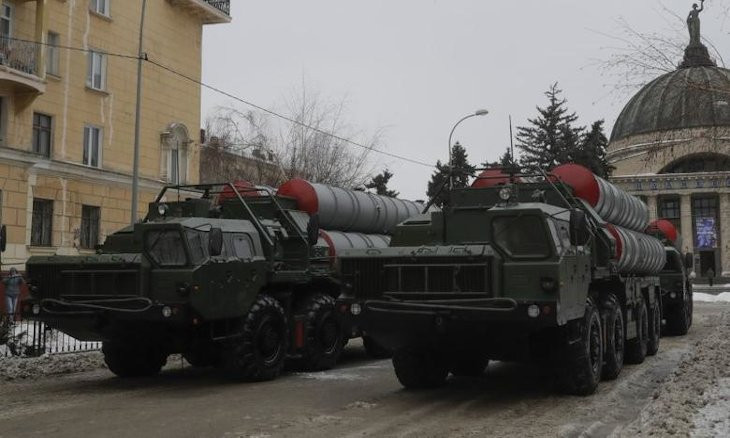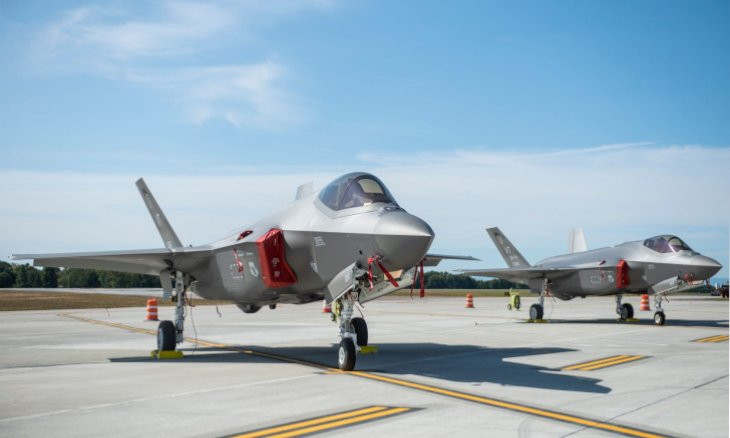US Air Force officially purchasing F-35 jets originally built for Turkey
The U.S. Air Force is officially purchasing eight F-35 fifth-generation stealth fighter jets that were initially intended for Turkey prior to its removal from the joint strike fighter program. The U.S. removed Turkey from the F-35 joint strike fighter program in July 2019 over Ankara's decision to buy Russian-made S-400 air defense systems.
Duvar English - Anadolu Agency
 Turkey 'tested Russia’s S-400 air defense systems on US-made planes last year'
Turkey 'tested Russia’s S-400 air defense systems on US-made planes last year'The U.S. Air Force is officially purchasing eight F-35 fifth-generation stealth fighter jets that were initially intended for Turkey prior to its removal from the joint strike fighter program.
In addition to the F-35A's built by Lockheed Martin for Turkey, the $862 million contract modification provides the aerospace manufacturer with an undetermined sum to reconfigure the jets in-line with U.S. models. The deal also includes an additional six F-35A jets for the Air Force.
The U.S. officially removed Turkey from the F-35 joint strike fighter program in July 2019 over Ankara's decision to buy Russian-made S-400 air defense systems.
Washington was clear that the fighter jets would not be sold to Turkey if it went ahead with the S-400 purchase from Moscow, which did not deter Ankara from acquiring it.
The U.S. and partner nations maintain the S-400 system poses security risks to the advanced jet, maintaining Russia could covertly use it to obtain classified details on the jet, and warning it is incompatible with NATO systems.
 US to work with Turkey on F-35 parts until 2022, Pentagon spokeswoman says
US to work with Turkey on F-35 parts until 2022, Pentagon spokeswoman saysTurkey, however, has countered that the S-400 would not be integrated into any NATO systems and would not pose a threat to the alliance.
Despite Turkey's formal expulsion, the U.S. and partner nations will continue to depend on Turkish manufacturing for key parts of F-35 fighter jets through 2022, Bloomberg reported in late June.
Although Turkey is banned from buying F-35s, Lieutenant Colonel Mike Andrews, a Defense Department spokesman, said a decision was made in late 2019 "to honor existing contractual arrangements and accept delivery of parts that were already on contract."
Andrews emphasized that the aim is to "avoid costly, disruptive and wasteful contract terminations."
The decision was heavily hinted at in a Government Accountability Office (GAO) report in May, which said Turkey's ouster from the F-35 program will likely compound its already beleaguered manufacturing process.
 US senators urge Pentagon to speed Turkey's expulsion from F-35 supply chain
US senators urge Pentagon to speed Turkey's expulsion from F-35 supply chainThe congressional watchdog determined that while the program has made progress in lowering prices and increasing production, about 7,000 of its more than 10,000 airframe contractors' "key processes" do not "meet predefined design standards for ensuring product quality," and it continues to face supply shortages that are likely to be exacerbated by Turkey's removal.
The GAO cited data from the Pentagon's Defense Contract Management Agency that said at the time of Turkey's removal, the program was facing increasing levels of late deliveries of aircraft parts and parts shortages.
It further noted that "risk remains" with the administration's plan to switch from Turkish to alternative suppliers, noting in particular that "some of these new parts suppliers will not be producing at the rate required until next year, as roughly 10 percent are new to the F-35 program."
